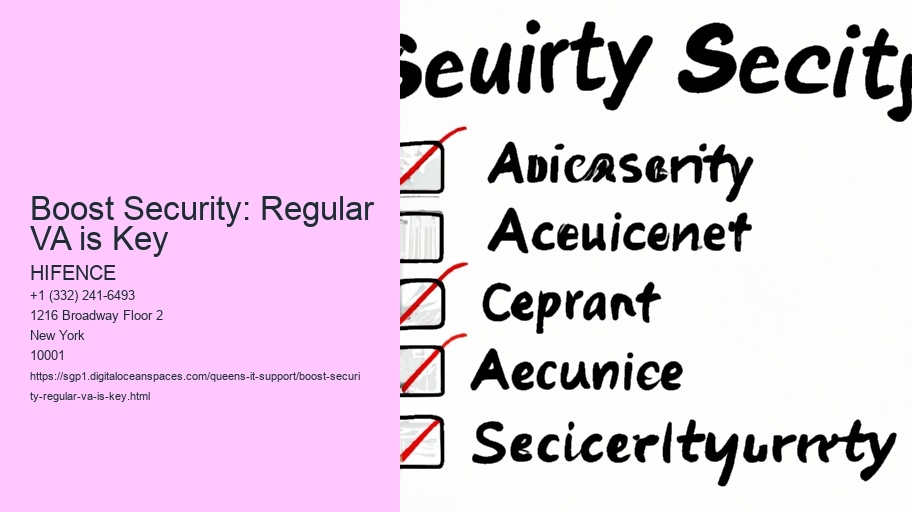
Understanding Vulnerability Assessments (VA): Boost Security: Regular VA is Key
Okay, so, like, vulnerability assessments (VA) are super important for keeping your stuff safe online. Think of it this way, your computer or your companys network is like a house, right? A VA is basically like hiring someone to walk around and check all the doors and windows for weaknesses. Are the locks strong enough? Is there a bush hiding a window that a burglar could easily pry open? Thats what a VA does, but for your digital assets!
Its not just about finding the obvious stuff, either. A good VA will dig deep, looking for software bugs, weak passwords (seriously, people still use "password123"?), and misconfigurations that could leave you exposed. And, heres the kicker (and the important part), doing it just once isnt enough!
Regular VA is key! (See what I did there?) Things change all the time. New vulnerabilities are discovered daily! Software gets updated (or not!), and your network environment evolves. So, if you did a VA last year, and havent done one since, youre basically driving around with bald tires. You might be okay for a little while, but eventually, youre gonna slip up and crash!
Think of it like going to the doctor. You dont just go once in your life, do you? You get regular checkups to catch problems early, before they become big, expensive messes. VAs are the same! They help you proactively identify and fix weaknesses before someone can exploit them. Its a continuous process, a constant game of cat and mouse, but its absolutely essential for boosting your security and staying ahead of the bad guys. And frankly, skipping it is just plain irresponsible! Whew!
Okay, so, like, boosting your security is super important, right? And honestly, a key part of that, (a REALLY key part!), is having regular vulnerability assessments, or VAs. Think of it this way, your network is like, a house. You lock the doors and windows, sure, but what if theres a hole in the roof you didnt notice? Thats where a VA comes in.
Regular VAs are crucial, I mean, really really crucial, because they help you find those "holes" (vulnerabilities!) before the bad guys do. You might have all the latest firewalls and fancy software, but if theres a coding error somewhere that lets someone sneak in, all that fancy stuff aint gonna help much. VAs scan your systems, like, constantly or at least regularly, looking for weaknesses.
Its not just about finding the big, obvious problems either. Sometimes its the little things, a misconfigured setting here, an outdated program there, that can be exploited. And things change, you know? New vulnerabilities are discovered all the time. So a VA you did six months ago might not catch everything thats a threat now.
Basically, without regular VAs, youre kinda flying blind. managed service new york Youre hoping everything is secure, but you dont know. And in todays world, hoping isnt enough! You gotta be proactive, catch those vulnerabilities, and fix em before someone else does. Its just, like, the smart thing to do for security!
Okay, so like, boosting your security? You gotta do regular vulnerability scanning. (Its kind of a no-brainer, really.) Think of it this way: your systems are like a house, right? And vulnerabilities? Theyre like unlocked windows or doors, just waiting for someone bad to stroll in and, you know, mess things up.

Consistent vulnerability scanning – think weekly, or even daily if youre super paranoid (maybe not paranoid, just responsible!) – helps you find those unlocked windows before the bad guys do. Its like a constant security check, highlighting areas where your security is weak. This allows you to patch things up, like, right away, before anyone can exploit them.
Plus, if youre doing it regularly, youre more likely to catch new vulnerabilities as they emerge. New threats are popping up all the time, and a scan from last month might not find the newest, nastiest exploit. So, staying on top of it is crucial.
Its also good for compliance! Many regulations require regular vulnerability assessments, so doing them isnt just good security practice; its often the law. (Dont get fined!)
Finally, and its super important, it gives you peace of mind, you know? Knowing that youre actively looking for weaknesses and fixing them is way better then just hoping for the best. It makes you, and your company, look way more secure! And who doesnt want that!
Okay, so when we talkin bout vulnerability assessments, it aint just one size fits all, see? Theres actually a few different types, and pickin the right one is, like, super important for boostin your security. (Duh, right?)
First, you got your network vulnerability assessment. This is where they scan your whole network, (like, everything connected!), to find weaknesses in your firewalls, routers, servers, and all that jazz. Theyre lookin for open ports, weak passwords, and any other way someone could sneak in, you know?
Then theres application vulnerability assessments. This is more focused on the software youre usin, like your website or your internal apps. They test for things like SQL injection, cross-site scripting (sounds scary, huh?), and other coding errors that could let hackers take control. Its basically checkin if your code is solid.
And then theres host-based assessments, which dive deep into individual systems. They look at the operating system, installed software, and configurations on a specific computer or server to see if theres any vulnerabilities there. Think of it like a really thorough check-up for one machine.
Authentication vulnerability assessments checks if your login stuff is secure! Are you using multi-factor authentication? Are your passwords strong enough?!
Choosing the right type really depends on what youre trying to protect and how deep you wanna go. But the key takeaway is doin regular vulnerability assessments is crucial for keepin your stuff safe! Its kinda like gettin a regular health check-up, but for your computer systems. You gotta catch those problems early!

Okay, so, implementing a vulnerability assessment schedule sounds like a real mouthful, right? But basically, its all about keeping your systems safe (or safer, anyway). Think of it like this: your house needs regular checkups, you know, to see if the roof is leaking or if the plumbing is about to burst. Vulnerability assessments are kinda like that, but for your computers and networks.
The "schedule" part is super important, though. You cant just do one VA and call it a day. Things change, new vulnerabilities pop up all the time, and what was secure yesterday might be a gaping hole tomorrow. (scary, I know!). So, you gotta plan it out. Maybe quarterly assessments, or maybe more often if youre dealing with really sensitive data. Depends, really.
Figure out what needs scanning, whos gonna do it (internal team, external experts, combo?), and what youre gonna do with the findings. No point in finding a hundred vulnerabilities and then just, like, ignoring them. Thats just asking for trouble, seriously! And dont forget to document everything. This helps you track progress and see if your security posture is actually improving over time. It might seem like a pain at first, but trust me, a solid vulnerability assessment schedule is a huge boost to your security! Its worth the effort, I swear!
Alright, lets talk about keeping our virtual assistants, and therefore our businesses, safe and sound. We all know regular VA (Virtual Assistant) is key, right? But knowing that isnt enough. We gotta actually do it! And thats where the tools and technologies come in handy.
Think of it like this: your VA is the key to the kingdom (your business, obviously). But what if someone steals the key? (Yikes!). Regular VA, or vulnerability assessment, is basically checking all the locks, making sure the key cant be copied, and generally keeping an eye out for shady characters.
So, what kinda tools are we talking about? Well, theres automated vulnerability scanners – NeXpose, Nessus, OpenVAS, take your pick! These bad boys will automatically scan your systems for weaknesses, like outdated software (which is a HUGE problem) or misconfigured security settings. Theyre like little digital bloodhounds, sniffing out trouble.
Then theres penetration testing tools. These are a bit more hands-on. Pentesting, or "ethical hacking," involves simulating an attack to see how well your defenses hold up. Think Metasploit or Burp Suite. Its like hiring someone to break into your house (with your permission, of course!) so you can see where you need to beef up your security.
Dont forget about good ol fashioned manual checks! Sometimes, the best way to find a security hole is to just look for it yourself. Reviewing access controls, checking logs, and making sure everyone is following security protocols (are they even aware of the protocols?) can go a long way. (Its surprising how often people just...dont!)
And finally, keeping everything updated is crucial! Outdated software is like leaving the front door unlocked. Patch management tools can help you automate the process of updating software and operating systems, making sure youre protected against the latest threats. Its a constant battle, but one we gotta fight.
Using these tools, and remembering that regular VA is important, ensures that your VA actually boosts security, and doesnt become a security liability!
Okay, so, addressing identified vulnerabilities, right? Its like, super important for boosting security, and I mean, regular vulnerability assessments (VAs) are key. managed it security services provider Think of it like this: your house has doors and windows, yeah? A VA is like checking all those doors and windows, making sure theyre locked, that the glass isnt cracked, and that nobody can just, like, waltz in and steal your stuff!
If you only check once, well, what if someone breaks a window the next day? Or finds a hidden spare key under a flowerpot (a big no-no, by the way)? Thats why regular VAs are so important. They help you find those weaknesses before someone else does! Its a proactive approach, see? Youre actively looking for problems instead of just waiting for something bad to happen.
And its not just about finding the vulnerabilities, its about, well, fixing them! Addressing them. You find a cracked window? You fix it! You find a software program with a known security flaw? You update it! Sometimes, its easy fixes, like changing a default password ( seriously, people, DO NOT use "password" as your password!). Other times, its more complicated, like, you know, implementing new security protocols.
Basically, regular VAs and addressing those vulnerabilities is like, the foundation of a good security posture. You cant just ignore it and hope for the best! (That never works!). It takes time and effort, but trust me, its way better than dealing with a security breach later on. Seriously, it is!
Okay, so, like, boosting your security? Its not a one-time deal, you know?
Maintaining a secure posture, what does that even mean? Well, it means constantly checking to see if theres any holes in your defenses. Think of it as like, constantly patching up a leaky boat. If you ignore the leaks, (even the tiny ones!), eventually, youre gonna sink! VAs are like that, they identify those weak spots before the bad guys do. A good VA isnt just a scan but a thoughtful review of security policies and procedures (and, you know, hoping everything works as it should!).
Regular VAs are key cause the threat landscape is always changing!. New vulnerabilities are discovered all the time, and hackers are constantly developing new ways to exploit them. If youre not regularly scanning and assessing your systems, youre basically leaving the door open for them. And who wants that?! Exactly, nobody! So get those VAs scheduled and keep your security ship sailing smoothly!